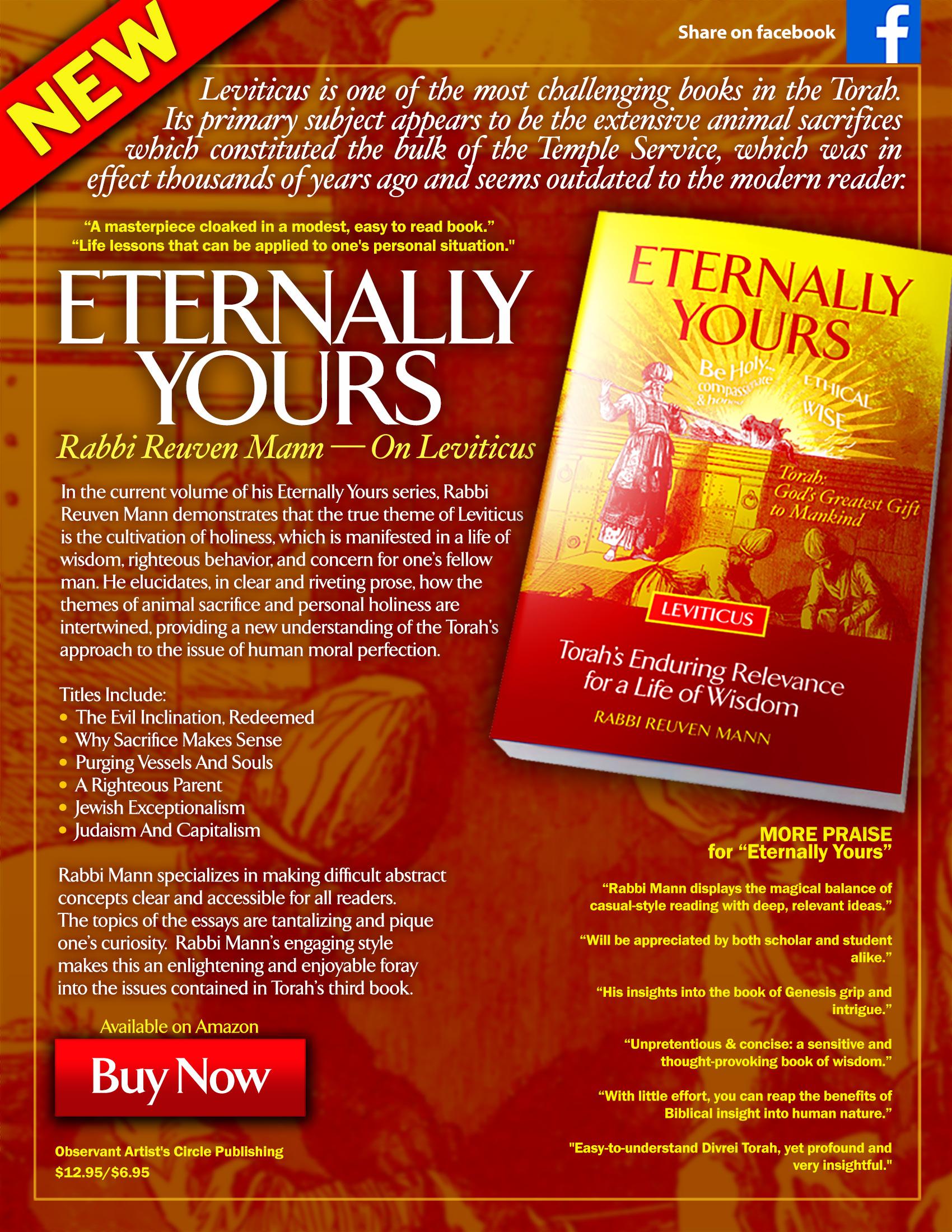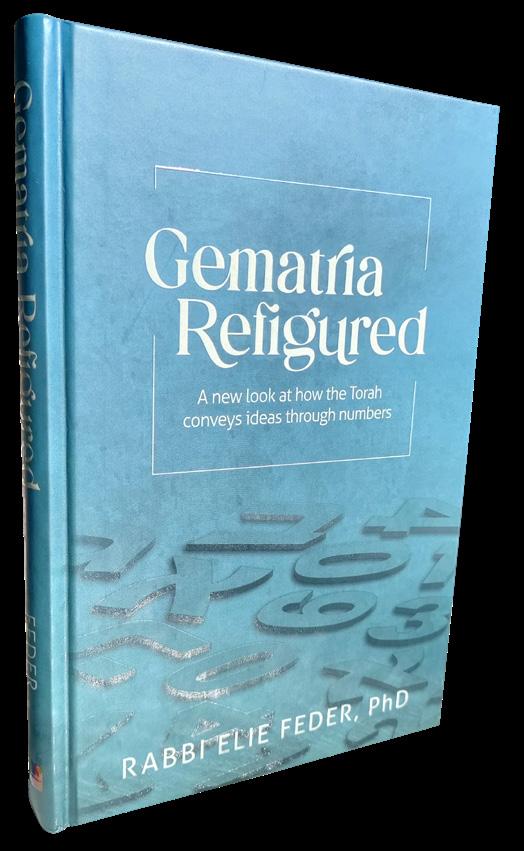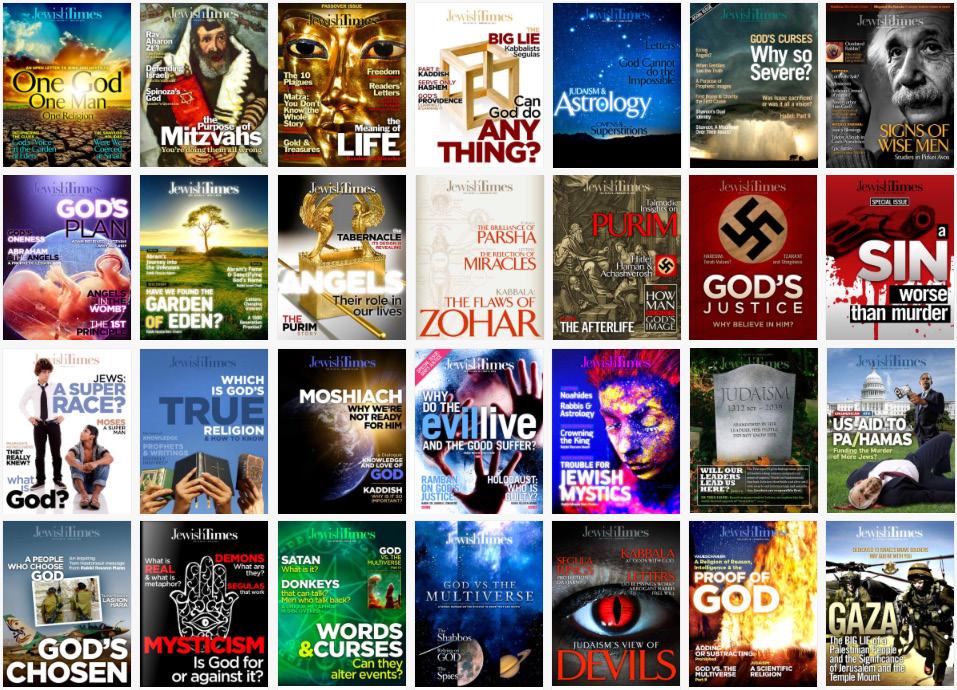
































Rabbi Israel Chait taught that man engages or encounters God in three actions: Torah study, prayer, and the ful llment of mitzvos. But when involved in work or mundane activity, we are not engaging God…unless we guide our mundane activities as Torah demands. Meaning, we are ethical in business and humble, kind, just and charitable with others.

God said, “Let there be light”; and there was light. God saw that the light was good, and God separated the light from the darkness” (Gen. 1:3,4).
At first we know only of the existence of light and darkness, but not about their behaviors: they might have been in static states, occupying separate regions of the universe with no interaction or change.

And it was evening and it was morning, the first day” (Gen. 1:5).
This introduces something new: there is a transition of light in the same location. With the repeated transition between darkness and light, “And it was evening and it was morning day 1, day 2, day 3 etc.,” we learn more: God created a “continuous” cycling transition between darkness and light. What is the purpose of this transition and cycle?
Sforno writes: Although God had made a separation between the light and the darkness, assigning to each di erent time frames in which to be active, independent of the planet earth revolving on its axis, He arranged for a transition from one phenomenon to the other to take place gradually, step by step. This occurred by means of inserting a period known as evening (erev) preceding total night, and a period of dawn (boker) preceding bright sunlight, daylight.
Sforno explains that even without Earth rotating, there was light and darkness. This is true, for as the sun shone on Earth’s western hemisphere, the eastern hemisphere facing away from the sun was in total darkness. Sforno also explains the new terms erev and boker: gradual transitions between day and night.


God changed the names of 5 phenomena. God called light “day,” and darkness He called “night.” He called the firmament “heavens,” the dry Earth He called “land,” and the collection of waters He called “seas.” However, God does not rename the substance of water, mountains, sun, moon, stars, man, animals, vegetation or any other creation.
Interestingly, these five names relate to heaven (day, night, heavens) and Earth (land and seas): His first [primary] creations: “In the beginning, God created the heavens and Earth” (Gen. 1:1). Furthermore, these 5 are prioritized, addressed first before all other creations. Also, what is the concept of “renaming” one thing and not another: Is the renamed thing thereby highlighted as more significant, and if so, in what manner?
“And it was evening and it was morning, day X,” is repeated many times. Why this emphasis of night transitioning into day? Primarily, what is the purpose of day and night? What in man’s path towards perfection demands this regulated transition between light and darkness? Why must night exist?
These phenomena of light and darkness and day and night are highlighted by the Shima’s blessings:
Blessed are you God, King of the world, forming light and creating darkness…
Blessed are you God, King of the world, with His word He sunsets the evenings…with understanding He changes times, and exchanges the moments…creating day and night, You expire day and bring night, and divide between day and night…
With “day,” “night,” “heavens,” “land” and “seas” God renamed these—and no other creation—to focus man on the purpose of creation, and our purpose in life. Constraining our ambitions (through darkness) and our geographical habitation to land—not water or heaven—God constrains
our involvement in a purely physical life—God constrains both our time and space. God redirects us towards the higher pursuit of Torah and perfection, matters of the soul. The physical serves only to enable the perfection of our souls. “Day and night” di er from “light and dark,” in that day and night are human measurements of activity, not visual phenomena of light or darkness. Animals perceive only light and darkness, not day and night. The latter two refer to human measures, to parts of a day when man changes his activities. Thus, day and night are ideas perceived by intelligent beings alone.
God renames light and dark to “day and night” to impose this perspective upon us, preventing our lives from being spent on only physical pursuits. Not only due to lack of light, but night also a ects us psychologically, when we recoil from our endeavors. Maimonides says that whomever desires to attain the crown of Torah should not let his nights go without Torah study. This is because with fewer distractions at night, we have greater focus on knowledge and gain so much more wisdom during these hours. And when land lies dormant in winter, God increases nighttime hours to increase our Torah study.
With “night” (darkness), God identified a time restriction over our physical pursuits. With seas, God restricted human travel and habitation. Both time and space contain restrictions as God wishes man restricts his physical pursuits, and uses the Earth as a means for a higher occupation: Torah study. Rashi states that if the Jews abandon Torah, God will return the Earth to an unformed and void state pre-Creation (Avos 2:8). And in His mercy, God made the transition from day to night a gradual change, o ering a type of warning sign to disengage in our physical pursuits. A sudden change from light to darkness would understandably bewilder man, and would place those people in danger who did not properly estimate nightfall.
Thus said the Lord: “As surely as I have established My covenant with day and night—the laws of heaven and earth— so too I will never reject the o spring of Jacob and My servant David; I will never fail to take from his o spring rulers for the descendants of Abraham, Isaac, and Jacob. Indeed, I will restore their fortunes and take them back in love” (Jer. 33:25,26).
If it is possible that the covenant that I formed with day and night to be in their time, should be abolished, and if it is possible for the statutes of heaven and earth to be abolished as though I had not set them, also the seed of Jacob would be abolished.
Rashi means that just as God will never abolish natural law, so too He will never abolish the Jews. Again we see a direct correlation between day, night, heavens, earth…and the Jew: those who follow Torah. Jeremiah equates Earth’s existence with the Jew: Earth exists for the purpose of man who studies Torah, the Jew.. ■




The greatest mitzvahs are those that help our souls reach their highest level, the purpose for which God created us.
These are precepts for which no fixed measure is prescribed: [leaving] the corner [of a field unharvested], first fruits, [holiday] Temple appearance, deeds of kindness, and the study of Torah.

These are precepts, the fruits of which man enjoys in this world, [while] the principal [reward] is preserved for him in the World-to-Come. They are: honoring father and mother, deeds of kindness, early attendance in the House of Study morning and evening, providing hospitality to guests, visiting the sick, participating in making a wedding, accompanying the dead [to the grave], concentrating in prayer, making peace between fellow men and between husband and wife— and the study of Torah is equal to them all. (Morning prayers, Mishnah Peah 1:1)
Commands of “no fixed measure” o er unique benefit, warranting their mention in mishna. And the second praise cited above are commands in which “the principle benefit awaits us in the World to Come.” This refers to the greatest perfection of the soul, as I will explain herein. These too are superior to other commands.
What is significant about a command that has no measure? Such commands enable fuller immersion in an act of perfection: a quantitatively greater degree than other commands. Here, all one's energies are diverted from all other areas and are dedicated to mitzvah. Man is totally focused on God's commands with no other thoughts in mind. But when performing a command that has a duration or fixed structure, in the back of his mind, man knows he’ll return to work; his mundane activities remain conscious, diluting his total immersion in that command. Thus, commands with no limitation or measure o er a greater level of involvement and greater
perfection. Furthermore, with no fixed measure, man may act more perfectly, and take upon himself to be overly generous in these mitzvahs.
The mishna then cites commands whose principle benefit exists in the World to Come. Although in all mitzvahs we gain, not all mitzvahs share this quality.
The first cited—honoring parents—obligates sons and daughters to suppress their personal wishes and plans. This obligation devolves squarely upon the children and not others. And although this applies too to children, not everybody has children, but everybody has parents. This mitzvah forces children to step outside their personal agendas and fully cater to another’s needs. More importantly, honoring parents—an authority—trains us in honoring the True Authority, as parents are a model for our subservient relationship to God. This was expressed in Marah, just prior to receiving Torah, when Moses taught the Jews the 3 laws of honoring parents, courts, and the Sabbath. The common denominator is that all 3 train man in accepting an authority. This was obviously necessary before receiving the Torah from the ultimate authority.
Other commands in this mishna are also between one and his fellow. They are situations where the self is not the beneficiary but it is solely another, such as accompanying the dead, visiting the sick and making peace between other people where others benefit, and not yourself. You are selfless. Attending weddings, one must forgive his own concerns for happiness and occupy himself with making another person happy. This too is a selfless act, as is providing hospitality to guests where your own privacy is invaded, not only in terms of sharing space with others, but tending to others’ needs and not your own.
Thus, selflessness is of great value. This is because when selfless, a person has removed himself from the convictions of self importance which are great blindspots in perceiving reality. Thus, correct morality is not only a value in itself, but also leads us towards objective truths: our lives are no more important than others. In this manner we recognize God's will to a far greater degree, we become more just and moral, as we view others as equally deserving, the opposite of when we are self-centered. We see others from God’s perspective, not our own.
Perfection is a two-step phenomenon where we must first correct our emotionally-biased state, and then engage our minds in objective truth, which is why Torah study outweighs everything. For it is Torah that gives us the objective of our lives: perceiving truths about God, His will, Torah and creation. But one must be earnest in his studies, as the mishna says, “early attendance in the House of Study morning and evening.”
Proper intent on prayer is included as well. This act
engages us in a dialogue with God. When properly performed, one fully accepts God’s reality, as one literally talks to Him. He accepts God’s complete rule over the world, as he asks God alone to help him, not intermediaries. Again in prayer, we are in a state of mind where we accept objective reality over a subjective selfish mindset where we are the focus.
This mishna teaches wherein lies our greatest perfection, explaining why the rabbis incorporated it into our morning prayers. The mishna addresses perfection through a “quantitative” measure, where some commands are without measure. The second part of this mishna addresses commands of a higher “quality” which greatly contribute to the perfection of our souls, the meaning of “the principle awaits us in the World to Come.” In these commands, we forgo our self-centered attitudes and seek the good for others. This brings our minds into a more objective framework. The more we engage in this objectivity, the more clarity we have in all areas. Our decision are no longer emotionally-based or selfish, which means our intelligence can operate to a greater degree. This in turn perfects our soul, thereby securing a greater portion of the World to Come. Prayer is an even greater step in confronting reality, as we confront God, and talk to him, making Him real. But the greatest act is our study of Torah, which is a direct means of grasping reality…it is not a preparatory act like catering to others. We must put this mishna into practice by praying properly, inviting guests, visiting the sick, participating in weddings, accompanying the dead, and certainly honoring our parents. This corrects our emotional focus, and by earnest Torah study, we correct our ideas and learn new marvelous truths.
“The principle awaits us in the World to Come” means when we pass on and our souls are detached from our bodies, our souls attain the highest level of our existence, when we perceive the greatest truths in heaven. This final state of being has been greatly enhanced by never catering to our egos, which allowed those energies to redirect towards God’s wisdom.
This is the highest level of perfection man can attain. Learning Torah Lishma—learning for no ulterior motive, or for the sense of accomplishment—but to simply appreciate the beauty of ideas, is the greatest level. Selflessness first contributes to objectivity, but the ultimate objective of selflessness is to allow the mind to be free from emotional considerations and decisions, to perceive wisdom for itself, and become attached to the Source of wisdom: Love of God. This can only be achieved when we are in full control or emotions, and do not follow them, but follow our minds. For until our minds are used to the full capacity, we cannot attain the fullest appreciation of wisdom, or God. ■



This change in attitude toward the Jews unleashed a torrent of abuse which included an attempt at genocide and finally took the form of cruel enslavement. The historical pattern for the Jewish exile was firmly set. Time and time again Jews would encounter the “Pharaoh experience” whereby they would be invited by various Kings to establish residence in their lands in order to benefit from the financial skills of these people. Invariably, the time would come when the deep resentments of the host population would become unbearable and the Jews would be told to leave.
However, the Book of Shemot does not deal with the question of Why. Why did Pharaoh and his advisers turn against the Jews? What did the Hebrews do to the Egyptians to warrant such cruel accusations and egregious treatment? Were the Jews guilty of any infractions which might legitimately have aroused the hostility of the Egyptians?
There is a principle that “The deeds of the fathers are a sign to the children.” This means that all the travails we may encounter in the long exile have already been experienced, in some form or another, by our founding leaders. In my opinion, the precedent for the Egyptian experience can be found in the story of Yaakov in his dealings with Lavan. As payment for his continued shepherding of Lavan’s flocks, Yaakov worked out a very extensive scheme, determining which of the newly born animals would be earmarked for Lavan and for Yaakov.
The plan worked very well, and Lavan’s flocks increased monumentally. Yaakov’s share was very substantial and “The man increased his possessions exceedingly; he had many sheep, female and male slaves, camels and donkeys” (Bereishit 30:43). But in spite of the fact that all of Yaakov’s wealth was obtained through honesty and hard work, the sons of Lavan were upset. “He (Yaakov) heard the words of Lavan’s sons, saying, ‘Yaakov took everything our father owns and amassed all this property from what belongs to our father’” (Bereishit 31:1).
The truth of the matter is that Lavan had deceived and mistreated Yaakov for many years. He cheated him out of the wife he had worked for, as per their agreement, for seven years and then, knowing of Yaakov’s great love for Rachel, managed to elicit an additional seven years of labor for that marriage. Indeed, as Yaakov told his wives, “Your father has cheated me and changed my wages ten times, but G-d did not allow him to harm me” (Bereishit 31:7).
The deeper causes of anti-Semitism are not to be found in the alleged misdeeds of the Jews. Certainly, there are despicable Jews who do terrible things, but their numbers pale in comparison with the miscreants of other ethnic backgrounds. Moreover, no one contributes more, in proportion to their numbers, to the welfare of society than the Jews. So why do they hate us so?
The Jews are di erent. We worship a di erent G-d, live according to a system of Mitzvot which determines what we can eat, whom we can marry and how we must interpret and understand Hashem’s revelation. There is a very deeply rooted fear that G-d’s Chosen People are, indeed, the despised ones, the Jews. Therefore, the growth, success and power of this nation constitutes a threat to all those who refuse to be reconciled to the unpleasant truth of Jewish choseness.
What can we do about this? It would be foolhardy to seek to diminish our Jewishness in any way. Yaakov sent a message to Eisav saying “I dwelled with Lavan and have tarried until now” (Bereishit 32:5). The Rabbis (midrashically) amend this statement to read, “I dwelled with Lavan and kept the six hundred and thirteen commandments and did not learn from his evil ways.”
The Jew must always be courageous and absolutely committed to being the chosen people by adherence to the Mitzvot and scrupulous ethical and moral behavior. We must seek to sanctify G-d’s Name in all that we do. The more we behave like an authentic Chosen People, the more will the nations admire us and seek to learn from our conduct. May we merit to attain this.
My newest book, Eternally Yours: G-d’s Greatest Gift To Mankind on VaYikra is available at: amazon.com/dp/B09SHRXS3Q (see next page)
I hope that my essays will enhance your reading and study of the Book of VaYikra and would greatly appreciate a brief review on Amazon.com. Additionally, for those in Eretz Yisrael, my books are available at David Linden’s bookstore located at Emek Refaim Street 21, Jerusalem and at Pomeranz Book store, Be’eri 5 Jerusalem. They are very nice stores to visit and browse.
—Rabbi Reuven Mann ■


Gematria is a polarizing topic. While many love it, many others view it with skepticism.
What is the purpose of gematria? Can we truly learn anything from the numerical representation of words?

What is beneath these creative yet apparently simplistic interpretations?
While jointly pursuing semichah and a PhD in mathematics, it seemed natural for Elie Feder to love gematria. However, he was bothered by these compelling questions. That is, until he discovered the purpose of gematria.
Gematria Refigured presents the discoveries that led to the author’s transformation from a gematria skeptic to a gematria lover. It develops a theory which elucidates how the Torah and Chazal use gematria to direct us toward a very specific type of idea. Through its many examples, this work illustrates how gematria can help us uncover novel insights, while providing interesting and clearly formulated perspectives into many mitzvos, themes, and stories in Tanach.


Buy on Amazon, click below: bit.ly/Gematria1

